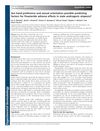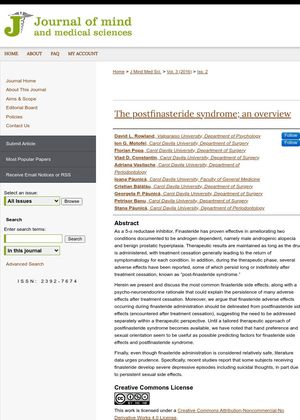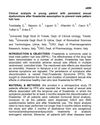 2 citations
,
August 2016 in “Experimental Dermatology”
2 citations
,
August 2016 in “Experimental Dermatology” Finasteride treats baldness but may cause lasting sexual side effects.
 57 citations
,
July 2016 in “The Journal of Sexual Medicine”
57 citations
,
July 2016 in “The Journal of Sexual Medicine” 5α-reductase inhibitors increase the risk of sexual dysfunction, especially in men with enlarged prostate.
 6 citations
,
April 2016 in “PubMed”
6 citations
,
April 2016 in “PubMed” The review found that women using hair loss drugs like finasteride and dutasteride rarely reported sexual side effects.
 2 citations
,
March 2016 in “Journal of Mind and Medical Sciences”
2 citations
,
March 2016 in “Journal of Mind and Medical Sciences” Finasteride, used for treating hair loss, can cause mental, physical, and sexual side effects, some of which may persist even after stopping the drug, and it can also cause mild to moderate oral issues.
 12 citations
,
March 2016 in “Experimental Dermatology”
12 citations
,
March 2016 in “Experimental Dermatology” Hand preference and sexual orientation may predict finasteride side effects in male hair loss.
 32 citations
,
February 2016 in “Journal of Dermatology”
32 citations
,
February 2016 in “Journal of Dermatology” Dutasteride safely promotes hair growth and reduces hair loss, with mild side effects.
 43 citations
,
January 2016 in “International Journal of Andrology”
43 citations
,
January 2016 in “International Journal of Andrology” Finasteride caused long-term sexual and non-sexual side effects in young men with hair loss.
5 citations
,
November 2015 in “Journal of Mind and Medical Sciences” Finasteride can cause serious physical, mental, and sexual side effects, even after stopping the treatment.
111 citations
,
August 2015 in “Reviews in Endocrine and Metabolic Disorders” 5α-reductase inhibitors may cause persistent sexual dysfunction and depression, needing more research on long-term effects.
 69 citations
,
July 2015 in “Pharmacotherapy”
69 citations
,
July 2015 in “Pharmacotherapy” Low-dose finasteride may cause lasting sexual dysfunction and suicidal thoughts in young men.
 20 citations
,
June 2015 in “Hormone Molecular Biology and Clinical Investigation”
20 citations
,
June 2015 in “Hormone Molecular Biology and Clinical Investigation” Finasteride worsens erectile dysfunction and lowers testosterone in men with enlarged prostates, unlike tamsulosin.
 33 citations
,
April 2015 in “Current Opinion in Endocrinology, Diabetes and Obesity”
33 citations
,
April 2015 in “Current Opinion in Endocrinology, Diabetes and Obesity” 5α reductase inhibitors treat hair loss but may cause sexual side effects and risks.
2 citations
,
January 2015 in “Journal of Investigative Dermatology”  28 citations
,
August 2014 in “Cancer Causes & Control”
28 citations
,
August 2014 in “Cancer Causes & Control” Taking 5α-reductase inhibitors does not significantly increase the risk of breast cancer in men.
 81 citations
,
June 2014 in “American Journal of Men's Health”
81 citations
,
June 2014 in “American Journal of Men's Health” Finasteride can cause lasting sexual, emotional, and cognitive issues, with varying severity.
 27 citations
,
June 2013 in “Alcoholism: Clinical and Experimental Research”
27 citations
,
June 2013 in “Alcoholism: Clinical and Experimental Research” Finasteride use may lead to less alcohol consumption in men with lasting sexual side effects.
18 citations
,
November 2012 in “Current opinion in urology” Finasteride and dutasteride are equally effective and safe for treating benign prostatic hyperplasia.
 71 citations
,
November 2012 in “Expert Opinion on Drug Safety”
71 citations
,
November 2012 in “Expert Opinion on Drug Safety” 5-alpha reductase inhibitors can cause sexual side effects like erectile dysfunction and reduced sexual desire, sometimes lasting after stopping the drug.
 19 citations
,
November 2012 in “BJUI”
19 citations
,
November 2012 in “BJUI” Left-handed men experience more sexual side effects from finasteride treatment.
 15 citations
,
October 2012 in “International Urology and Nephrology”
15 citations
,
October 2012 in “International Urology and Nephrology” Low-dose finasteride may cause fertility issues, but stopping it can improve sperm quality and lead to pregnancy.
 134 citations
,
August 2012 in “The Journal of Clinical Psychiatry”
134 citations
,
August 2012 in “The Journal of Clinical Psychiatry” Former finasteride users with persistent sexual side effects have higher rates of depression and suicidal thoughts.
 112 citations
,
July 2012 in “The Journal of Sexual Medicine”
112 citations
,
July 2012 in “The Journal of Sexual Medicine” Finasteride may cause long-lasting sexual side effects.
 185 citations
,
March 2011 in “The Journal of Sexual Medicine”
185 citations
,
March 2011 in “The Journal of Sexual Medicine” Finasteride for hair loss can cause long-lasting sexual side effects like low libido and erectile dysfunction.
 36 citations
,
February 2011 in “Fertility and Sterility”
36 citations
,
February 2011 in “Fertility and Sterility” Finasteride use may cause sperm damage and infertility, stopping it can improve sperm health.
 23 citations
,
December 2010 in “Journal of Dermatology”
23 citations
,
December 2010 in “Journal of Dermatology” Finasteride helps hair loss patients' quality of life.
 12 citations
,
January 2010 in “PubMed”
12 citations
,
January 2010 in “PubMed” No definitive link between finasteride and male breast cancer, but further research is needed.
 47 citations
,
June 2009 in “Journal of Biological Chemistry”
47 citations
,
June 2009 in “Journal of Biological Chemistry” Finasteride helps treat hair loss and prostate enlargement by blocking a specific enzyme.
 9 citations
,
January 2009 in “PubMed”
9 citations
,
January 2009 in “PubMed” Finasteride treatment can decrease certain steroids and increase others, possibly leading to depression symptoms in some cases.
 137 citations
,
March 2006 in “Cns Drug Reviews”
137 citations
,
March 2006 in “Cns Drug Reviews” Finasteride treats enlarged prostate and hair loss, but may cause side effects in some patients.
 93 citations
,
January 1996 in “Clinical Pharmacokinectics”
93 citations
,
January 1996 in “Clinical Pharmacokinectics” Finasteride helps regrow hair and shrink prostate by reducing DHT, with some sexual side effects.




































